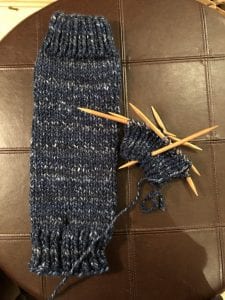One of the great things about researching teacher development through community of practice is that I can be in research mode most of the time, and it just looks like having conversations (because that’s what it is). The conversation that’s been happening lately tends to dwell on the idea of trying to put oneself in the learners’ shoes.
When I was a kid, my mother tried to teach me to knit. But she’s a lot like me – I have a ton of patience with my students, but if I try teaching my husband something, I get super frustrated almost immediately. It’s like I know he’s really smart, so why isn’t he immediately getting this thing, that is so easy to do? What does he mean, what does ‘sauté the onions’ mean?
So when my mum taught me to knit, I think it must have been the same – I wasn’t getting it right away, so she got frustrated, which made me flustered and unhappy, which made knitting into something that I didn’t like. Something I wasn’t good at, and there were plenty of other things I was good at, so why would I waste my time on this?
Then as an adult, I got into crochet. I really wanted a scarf, a long, wide, warm scarf, and I couldn’t find one that fit the bill, so I said, OK, how hard can this be? I found a few tutorials and blogs online, got some yarn and a crochet hook, and figured it out. Boom, scarf. So I spent a few years crocheting, but then I started to think, OK, if I can do this, I can figure out how to knit, right? So again, I went online, and found tutorials with images. The videos weren’t helpful for me, but there’s so much out there that it’s easy to find the approach that works for you.

I made more scarves. I made blankets. I got pretty good at variations on the quadrilateral – then, earlier this winter, I made myself a pair of legwarmers. Halfway through the first one, I realized that a legwarmer is pretty much just a sleeve. So I found a really simple sweater pattern, and I made a sweater. That first one, I remade twice. But I figured it out, and then realized that I was actually good at this, after all.
One thing that struck me was that when I first started, I had to look up how to do the basic stuff, every time. How do I cast on? I did it for the last project, but I need a reminder. I had a couple of knitting sites bookmarked so I could translate the weird knitting pattern shorthand, then go find a tutorial for how to do the stitch itself. Then I got to the point where I didn’t need the reminders anymore. The basic stitches and common techniques were second nature. I still find that if I encounter a new stitch or technique that I need to try it a few times – I find it hard to visualize what it should look like. But then once I’ve done it, I’ve got it.
I was talking about the importance of sometimes being a beginner with a colleague. We are both experienced teachers, both with advanced degrees in our respective fields, and both committed to a reflective practice. But when I told him how valuable I thought my learning-to-knit process was, he looked skeptical.
“Being a beginner is scary,” he said. “I’d feel too vulnerable. I don’t want to look like I don’t know what I’m doing.”
Of course, that’s true – but it’s also a big part of why we teachers need to be willing to be learners, even if we are so inexperienced as knitters, or skiers, or onion sautéers that we feel stupid or slow or frustrated. How many of our students feel exactly that way the first time they sit in our classrooms? How many of them are still trying to remember how to cast on, but we’ve forgotten that once upon a time, casting on wasn’t second nature to us?
I hear a lot of teachers talk about the evils of rote memorization, and it’s certainly true that learning can’t be just that. But maybe we’re so averse to memorization because we’ve forgotten what we’ve memorized. Those basics are so ingrained in our minds, in our practice, that we don’t see that we needed to remember it. That once upon a time we didn’t know how to cast on. That we didn’t know what sauté the onions meant. That we didn’t just know the alphabet. How many of us still mentally recite the alphabet song when we’re doing our reference list?
So my take away is twofold: try to remember what I’ve forgotten I didn’t always know, and be willing to be vulnerable, to look like I have no idea what I’m doing, and acknowledge that sometimes, some of them feel exactly that.